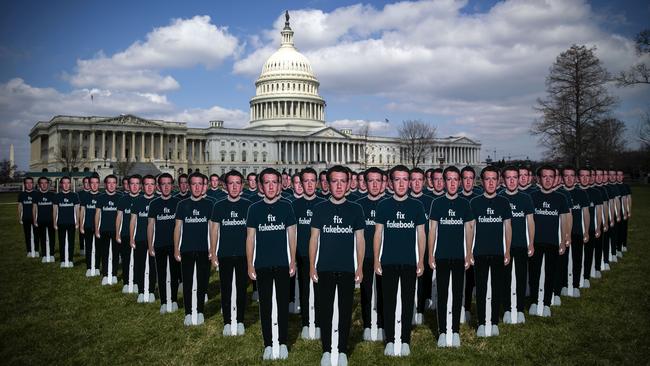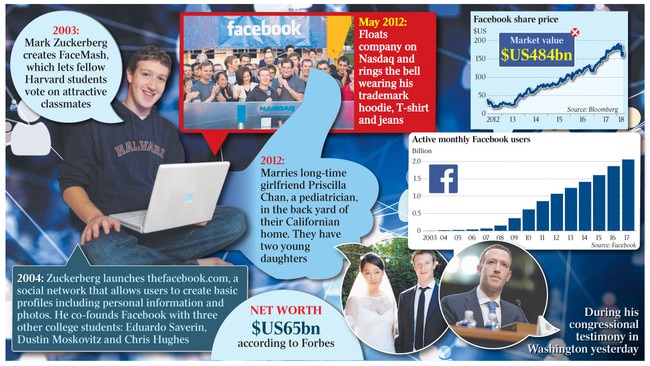Facebook’s Zuckerberg deep-grilled on Capitol Hill
Sorry won’t do this time, US legislators tell Mark Zuckerberg.

During the marathon questioning of Facebook chief executive Mark Zuckerberg on Capitol Hill this week, Democratic senator Richard Blumenthal of Connecticut said what many of his colleagues were thinking.
“We’ve seen the apology tours before … I don’t see how you can change your business model unless there are different rules of the road,” he told the Facebook founder and chief executive.
Republican senator Lindsey Graham went further. “Here’s the question that all of us got to answer,” he said in his South Carolina drawl. “What do we tell our constituents, given what’s happened here, why we should let you self-regulate?”
The extraordinary two-day grilling of Zuckerberg, which held Washington spellbound, shows how far Facebook has fallen in the eyes of US politicians.
Members of congress from both sides of politics had trusted the social network and other tech giants to behave like good corporate citizens with minimal government oversight as they carved out, in the words of Republican senator John Thune of South Dakota, the American dream.
Now Facebook and Zuckerberg have proved them wrong, forcing the US congress to reconsider its laissez-faire approach to the tech sector. “In the past, many of my colleagues on both sides of the aisle have been willing to defer to tech companies’ efforts to regulate themselves,” Thune said. “But this may be changing.”
If so, it is a tectonic shift that will also have implications for Google, Apple, Amazon and Microsoft, as the tech giants face the possibility of losing their special status and being regulated just like any other US industry. Zuckerberg and Facebook have long been hostile to greater scrutiny and regulation, preferring to develop the social network in an opaque greenhouse of secret algorithms and advertising formulas far away from public or corporate scrutiny.
But Zuckerberg knew this week he had to welcome the concept of greater regulatory oversight of Facebook as a part of his public contrition for all that had gone wrong with his company during the past two years.
“My position is not that there should be no regulation. The real question is what is the right regulation,” Zuckerberg said when asked why his company should be trusted to self-regulate. During his second day of congressional testimony on Wednesday, he conceded regulation of the tech sector was now “inevitable”.
The 33-year-old billionaire even claimed it was “certainly worth discussing” whether US tech giants should be subjected to far stricter privacy laws such as those that will be introduced in Europe next month.
The irony is that tech giants have been spending growing amounts of money to lobby Washington against regulating their industry. Google spent more last year than any other US company to influence the White House and congress. Amazon also lifted its lobbying spend in Washington by 16 per cent to $US13 million ($16.7m), Apple lifted its budget by 51 per cent to $US7m and Facebook’s lobbying bill rose 32 per cent to a record $US11m.
However, Zuckerberg has little choice but to swallow some bitter pills in an effort to restore his credibility and that of Facebook in the face of scandals over the misuse of data, the company’s cavalier attitude to privacy and allowing nefarious players from Russian intelligence to neo-Nazis to exploit the platform.

The question is whether Zuckerberg’s unreserved apology to congress for his mismanagement of Facebook can be believed. As Thune said: “After more than a decade of promises, how is today’s apology different?”
The Washington Post this week published a long list of Zuckerberg’s public apologies since 2003 including ones from 2006, 2007, 2009, 2010 and 2014, and then the recent slew over the Cambridge Analytica data breach scandal.
“It reads like a record on repeat,” the Post said.
“Zuckerberg, who made ‘move fast and break things’ his slogan, says sorry for being naive, then promises solutions such as privacy ‘controls’, ‘transparency’ and better policy ‘enforcement’. And then he promises it the next time. All the while, Facebook’s access to our personal data increases and little changes about the way Zuckerberg handles it.”
Zuckerberg defends himself by claiming that many of these mistakes were inevitable given the frenetic growth of Facebook, which after 14 years of existence hosts about 2.2 billion daily users worldwide.
“We have made a lot of mistakes in running the company. I think it is pretty much impossible to start a company in your dorm room and grow it to be at the scale we are now without making some mistakes,” he told congress.
“Overall we are going through a broader philosophical shift in how we approach our responsibilities as a company. For the first 10 or 12 years as a company I viewed our responsibility as primarily building tools, and if we could put those tools in people’s hands then that would empower people to do good things.
“What we have learned now across a number of issues, not just privacy but also fake news and foreign interference in elections, is we need to take a more proactive role and a broader view of our responsibility. It’s not enough to just to build tools, we need to make sure they are used for good.”
This time Zuckerberg insists he is not the boy who cried wolf and that he really is sorry. In his appearance on Capitol Hill, Zuckerberg not only apologised for his own mistakes, he also went further than he has previously towards accepting responsibility for what appears on Facebook rather than insisting it is a neutral technology, as he has done in the past.
“I agree we’re responsible for the content, but we don’t produce the content,” Zuckerberg said. “When people ask us whether we’re a media company or a publisher, what they’re getting at is: do we feel responsible for the content on our platform? I think the answer is clearly yes.”
But Facebook and other big tech companies are fearful that congress may consider repealing legal protections dating back to the 1990s that mean tech giants generally cannot be held legally responsible for the bad behaviour of those who use their platforms.
Congress recently voted to end the legal immunity for websites that facilitate online sex trafficking. This has led to speculation that it may go further and chip away legal protections for companies such as Facebook that do not properly police their platforms.
“I think it is a wake-up call,” Thune said when asked about the issue. “In the future tech companies have to understand that it’s not the wild west and they have to exercise responsibility.”
As expected, Zuckerberg was assailed from all sides during two days of often hostile questioning by Senate committees and then by house committees.
In calm and measured tones, he explained how Facebook waded into each scandal and how he bore ultimate responsibility. He also described a raft of new measures he has introduced that he believes will prevent the future abuse of Facebook.
Zuckerberg described the series of errors Facebook made in not pursuing the analytics firm Cambridge Analytica in 2015 to ensure that it had erased the data on 87 million users that it had improperly obtained. He also admitted this week that his own data had been compromised as a result of the controversy. “We considered it a closed case,” he said. “In retrospect, that was clearly a mistake. We shouldn’t have taken their word for it.”
As a result, he said, Facebook would trawl through “tens of thousands” of third-party apps to make sure there was not another Cambridge Analytica out there. The process raises the possibility that Facebook will uncover more examples of misuse of its data in the months ahead.
Zuckerberg used his testimony to outline a range of measures to better identify bad players such as the Russian trolls who used Facebook to plant disinformation aimed at influencing the 2016 US presidential election in favour of Donald Trump.
“We were too slow to stop Russian interference and we’re working hard to get better,” he said.
“I don’t want anyone to use our tools to undermine democracy, that’s not what we stand for.”
Zuckerberg also was hit with questions about whether Facebook was too left-leaning and was guilty of censoring conservative political views.
During a fiery five minutes, Texas Republican Ted Cruz took Zuckerberg to task, accusing Facebook of a “pervasive pattern of political bias” against conservatives.
Zuckerberg acknowledged that Facebook’s home base of Silicon Valley in California was “an extremely left-leaning place” but denied that Facebook has acted as a booster for liberal politics.
“Our goal is certainly not to engage in political speech,” he said. “I’m very committed to making sure Facebook is a platform for all ideas.”
The broad view in Washington after Zuckerberg’s two days of testimony was that he did as well as could be expected and that he didn’t inflict further damage on Facebook’s reputation.
The well-coached Zuckerberg was appropriately contrite, unfailingly polite in the face of hostile questioning and more forthcoming than he has been in the past with his answers.
But he still failed to properly explain his company’s business model, leaving many members of congress visibly confused.
Senators also appeared sceptical that the new measures Zuckerberg introduced to safeguard personal data, improve piracy and police Facebook against abuse would work.
The question now is: what will congress do? The public mood for better regulation of Facebook is higher than ever.
A Gallup poll this week found that 43 per cent of Americans are “very concerned” about Facebook’s invasions of privacy — an increase of 13 per cent since 2011, when Gallup conducted a similar poll.
But members of congress, particularly Republicans, traditionally have been adverse to imposing corporate regulations on the tech sector. Some of them are content to leave it to the government’s chief privacy regulator, the Federal Trade Commission.
The FTC is already conducting an investigation into Facebook’s privacy practices and whether the tech giant may have breached its 2011 deal with the agency concerning user privacy.
But potential legislative options include trying to apply antitrust powers to police the misuse of data by companies such as Facebook. Congress also could pass laws requiring such companies to fully disclose how they collect, share and use consumer data.
Each of these options is fraught with legal and ethical minefields and may be difficult to win bipartisan agreement on.
As such, new laws to regulate the tech sector will take many months, if not years, to pass, by which time they may be redundant in the face of the fast-moving tech industry and tech trends.
The mostly aged members of congress also are not a tech-savvy bunch and are poorly placed to debate meaningful regulation of the tech giants.
In their questions this week, many congressmen betrayed a surprising lack of understanding about how Facebook works.
At times Zuckerberg was forced to explain how the social network operates, in the same basic way a grandchild may use with their grandparents.
But certainly the mood, even among many Republicans, is that more needs to be done to rein in Facebook.
As Republican senator John Kennedy of Louisiana put it during a testy exchange with Zuckerberg, “I don’t want to have to vote to regulate Facebook but by god I will.”
Democratic senator Bill Nelson of Florida was no less blunt.
“If Facebook and other online companies will not or cannot fix these privacy invasions, then we will,” he said.
Zuckerberg’s testimony this week has only highlighted the need for reforms to make Facebook and other tech giants accountable for the social and civic consequences of their creations.
Cameron Stewart is also US contributor for Sky News Australia.



